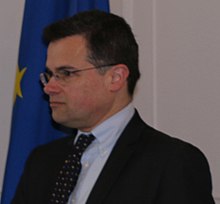
Oliver Kamm (born 1963) is a British journalist and writer who is a leader writer and columnist for The Times.

Oliver Kamm (born 1963) is a British journalist and writer who is a leader writer and columnist for The Times.
Kamm is the son of translator Anthea Bell and publisher Antony Kamm.[1] Kamm is the grandson of Adrian Bell and nephew of Martin Bell. He studied PPE at New College, Oxford[2] and Birkbeck College, University of London.[citation needed]
Kamm started his career working in the City of London as an economist and investment strategist.[3]
Kamm joined the Times staff in 2008.[4] He has also contributed to The Jewish Chronicle, for which he writes regularly,[5] Prospect magazine,[6] and The Guardian.[7]
In his writings, Kamm supported Tony Blair's foreign policies.[8]
Predominantly identifying with New Labour and liberal interventionism, he is a prominent supporter of former British Prime Minister Tony Blair. An advocate of the foreign policies pursued by the Blair government, Kamm wrote a short book, Anti-Totalitarianism: The Left-wing Case for a Neoconservative Foreign Policy (2005), which puts forward the case for an interventionist neoconservative foreign policy.
That year saw the election of the 'New Labour' government of Tony Blair, which Kamm strongly supported, particularly its foreign policy and 'liberal interventionism'.[9] Although generally supportive of the Labour Party in the 2005 general election, Kamm stated that he could not support Celia Barlow, the Labour candidate in his local constituency, Hove, because of her opposition to Blair's foreign policies. Instead, he stated that he would vote for the Conservative candidate, Nicholas Boles, who supported the Iraq war.[10]
In 2006, he was a signatory to the Euston Manifesto, arguing for a reorientation of the left around what its creators termed 'anti-totalitarian' principles. He favourably commented on Peter Beinart's The Good Fight: Why Liberals—and Only Liberals—Can Win the War on Terror and Make America Great Again, which has similar themes to Kamm's own book, arguing that the left should look to the policies of Clement Attlee and Harry S. Truman in the early days of the Cold War as a model for response to Islamism and totalitarianism.[11] According to John Lloyd in 2005, in Anti-totalitarianism, Kamm views Blair's policies "as the expression of true social-democratic values".[12]
Despite believing the Labour Prime Minister Gordon Brown was unsuited for office, Kamm voted for the party at the 2010 general election.[13] In September 2011, Kamm wrote in the New Statesman that he supports the Euro and admonishes Labour's recent criticisms of it: "Monetary union is not the cause of the crisis. Done properly, it may help insulate member states from disruptive volatility in the international capital markets".[14] He criticised Ed Miliband's stand on immigration before the 2015 general election, finding the Labour leader's position decidedly illiberal.[13] He believes current controls are far too tight, that immigration is economically beneficial, and such arguments against incomers are based on the Lump of labour fallacy.[13]
Kamm voted for his local Labour MP, Meg Hillier, at the 2017 general election because Hillier is a non-Corbynite who voted in parliament against the UK's implementation of Article 50 beginning the process of British withdrawal from the European Union.[15]
Kamm supported the 2003 Invasion of Iraq, and asserted that "the world is a safer place for the influence" George W. Bush had during his presidency.[16] Although critical of George W. Bush linking Saddam, Iran and North Korea in a combined "axis of evil".[16]
Because of Kamm's position on war and terrorism, the commentator Peter Wilby asserted that while he claims "to be left-wing" Kamm" holds "no discernible left-wing views".[17] Kamm rejects this criticism, saying that he "claim[s] to be left-wing, for the straightforward reason that it's true". He elaborates on his support for left-wing policies such as economic redistribution, progressive taxation and a welfare state. He also supports legal abortion and gay marriage.[18] When interviewed by politics academic Norman Geras in 2003, he said that he wrote to "express a militant liberalism that I feel ought to be part of public debate but which isn't often articulated, or at least not where I can find it, in the communications media that I read or listen to" and that he felt that "the crucial distinction in politics is not between Left and Right, as I had once tribally thought, but between the defenders and the enemies of an open society."[19] Kamm wrote that former Prime Minister James Callaghan's "greatest single achievement" was to "destroy socialism as a serious proposition in British politics."[20] In 2008, he supported the rendition of suspected terrorists.[21]
Regarding the bombing of Dresden, he has asserted that the bombing of the city "was not a crime. It was a terrible act in a just and necessary war."[22]
Other publications Kamm has contributed to include The Jewish Chronicle, for which he writes most months,[23] Prospect magazine,[24] and The Guardian.[25] In Prospect in February 2016, he wrote that he had resigned from the Frontline Club after founder Vaughan Smith had given refuge to Julian Assange at the club. Kamm wrote that "Smith’s statement in defence of his decision tellingly made not a single reference to the women Assange is alleged to have attacked."[26]
Kamm has written two books. In his Anti-Totaliatarianism book, he argues that military intervention against totalitarian regimes to support democratic values in other countries, can be expression of left wing values; he supports the 2003 invasion of Iraq under this rubric and seemed to be focusing his argument against foreign policies stances based narrowly on the national interest that are typical of the traditional right.[27] On his book on usage, he argues against linguistic prescription and in favor of linguistic description and clear, vigorous writing.[28]